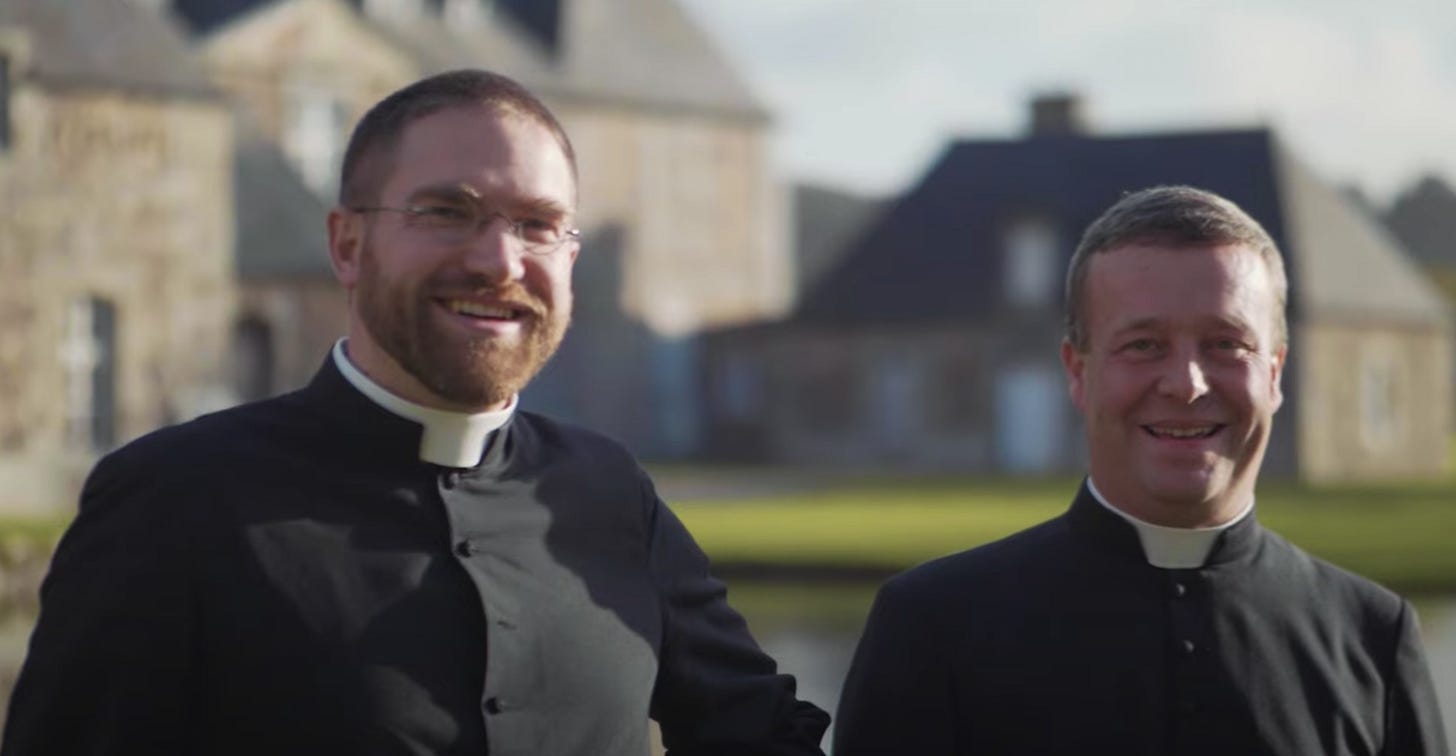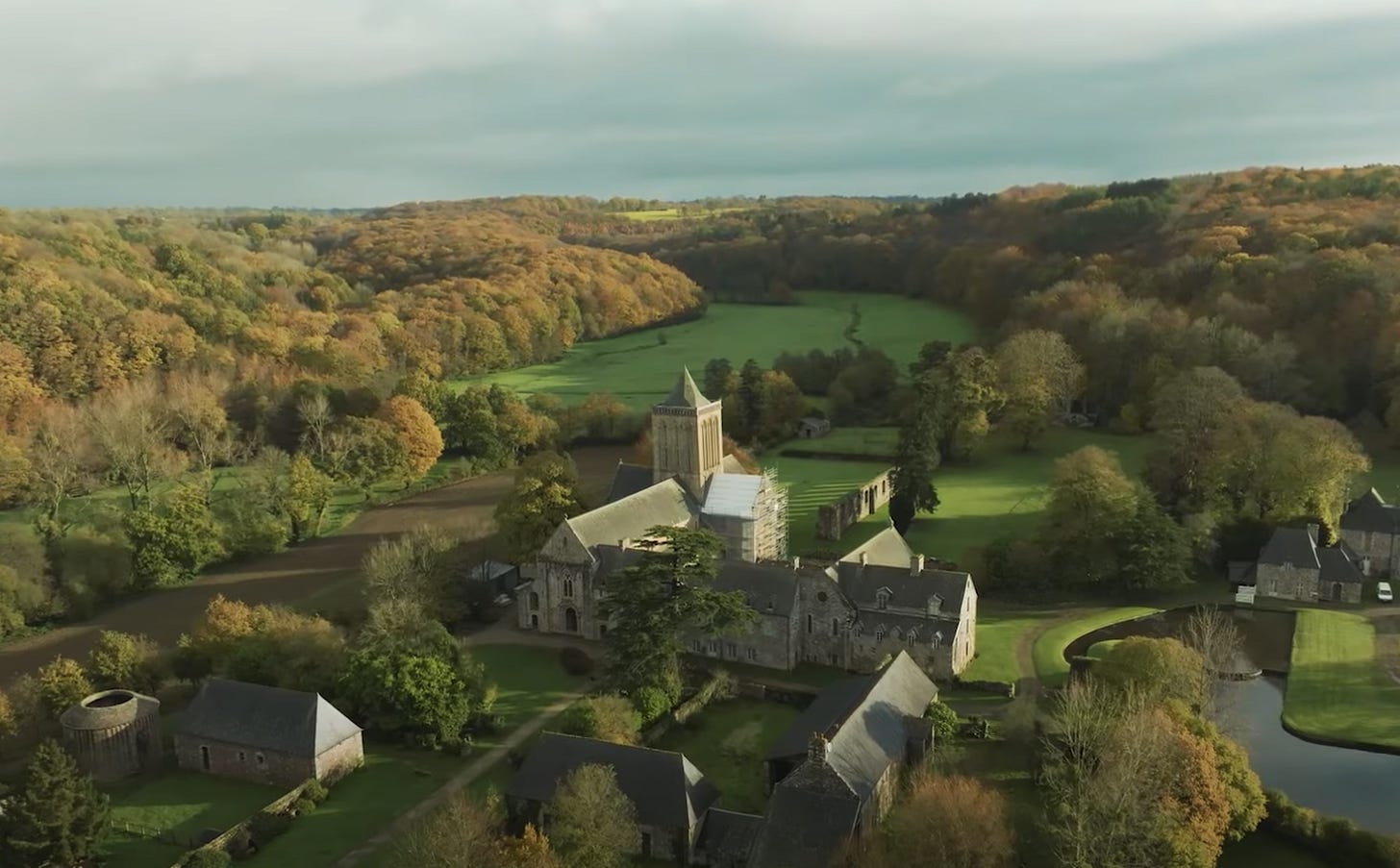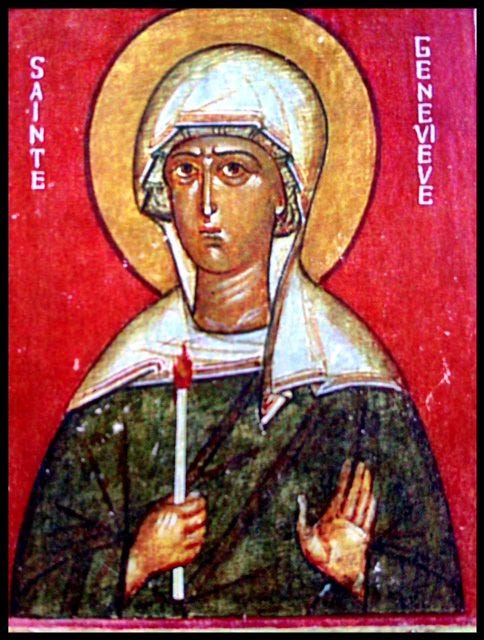A couple of weeks ago in Budapest, I ran into my friend Solène Tadié, a correspondent for EWTN and the National Catholic Register. She told me she had just returned from a reporting trip to Normandy, where she visited La Lucerne, a monastery that has embraced a Benedict Option project. Said Solène, “The abbé told me that they were inspired by the American writer Rod Dreher.”
What?! She told me I would know more when her piece is published in the Register. Well, now it has been. What great news! I share it with you Western Christian friends on your Good Friday, as a reminder of the light that shines in the darkness, which could neither comprehend not overcome it. Excerpts:
Underneath the European nation’s relentless wave of de-Christianization, solid new initiatives continue to quietly flourish, unperturbed by the surrounding adversity. They are destined to take root in the country’s landscape, like dozens of small fireflies in the night.
Indeed, there couldn’t be a better metaphor to describe the project led by the medieval Abbey of La Lucerne, located in the heart of the forests of the Thar Valley, near the Mont Saint-Michel Bay in Normandy. Taking its name from the Latin Lucerna (lamp), a term that also refers to the office that the first Christians sang on Saturday night to remember Christ the Light watching over humanity, the building erected in the 12th century is one of the oldest Premonstratensian abbeys in Europe.
Sold as public property during the French Revolution after centuries of glorious spiritual influence, and subsequently left to decay in the 19th century, La Lucerne experienced an initial renaissance under the impetus of a zealous abbot, Marcel Lelégard (1925-94), who undertook a colossal restoration work during the second half of the 20th century.
It is a project of a new magnitude that was initiated a few months ago by the young abbots Guillaume Antoine and Henri Vallançon. Living according to the Rule of St. Augustine without belonging to the Premonstratensian Order, they were entrusted by the bishop of their Diocese of Coutances and Avranches with the mission of developing a spiritual and cultural center, intended to “quench the thirst” for beauty and transcendence of a growing number of people disenchanted by the ephemeral attractions of postmodernity.
They are making La Lucerne into a center of intentional Catholic community:
As such, the center, which is still in its infancy, was designed to grow into a village that will bring together religious and laypeople, all of whom will be called upon to put their respective skills, both intellectual or manual, at the service of the community.
Retreatants, families, artists, pilgrims ... this secular abbey will soon be able to welcome all kinds of travelers in its accommodation wing, still under construction. The events that will be held there will touch on the most varied artistic and intellectual expressions, as long as they respond to a real search for truth and aesthetics.
“The goal is to weave a Catholic matrix between people with specific skills and to insert these talents into the daily life and programming of our spiritual center,” Father Guillaume Antoine, rector of La Lucerne, told the Register.
The priests who live there say daily mass facing East, according to the Church’s ancient tradition, and use Gregorian chant. They also chant the Daily Office — it’s open to all visitors to participate. La Lucerne is not far from Mont-Saint-Michel, by the way. And already French Catholic families are moving to live nearby and help build a community with the monastery at its center. It turns out that some American Catholics are helping too.
This part knocked me out:
“We are at a geographic crossroads in the Franco-American friendship, and through this project we aim to renew and enhance those ties,” Father Antoine said, stating that the project idea was inspired by the American writer Rod Dreher’s book The Benedict Option.
Read it all. I’m so humbled to have been part of this. La Lucerne is exactly what I hoped for when I wrote the book. I’ve got to get back to Normandy to visit these priests and this community. Here is a link to La Lucerne’s website (in English). Please visit it, and see how you can help!
Here’s a very short video produced by the Normandy tourism office, showcasing La Lucerne (no dialogue):
Here is a video in French in which the two priests in charge, and others, describe the project. There are no subtitles, but you don’t have to speak French to get a basic understanding of what they’re talking about. This is so exciting!
Here is Part II of that video — again, it’s in French, but you don’t need to speak French to get the gist of what they’re saying. The priests explain that they are transforming the medieval abbey into a stronghold of prayer and spiritual life, but also one where art and music are celebrated and woven into the religious life of the abbey, and also the botanical and agricultural life of the region. There is no separation of Church and Life at La Lucerne.
Here is a link to the schedule of events at La Lucerne. Can you imagine having something like this nearby?
If you, reader, want to know how to support La Lucerne with your prayers and your donations, go to this page.
You who read this daily diary know how much darkness is in it. I don’t write about these things for fun, or out of morbid curiosity. I write them because I deeply believe that good people — especially good people who share my faith — need to understand the times, and to prepare for maintaining faith and moral order in this time of decline, fall, and dissolution. I focus on the darkness because so very many of us have not understood it, and live in denial, like the pagans of fourth century Rome, who told themselves that the Christians were just a passing phenomenon, not threatening the stability of the pagan order.
I also dwell on these things so that we can better understand the particular forms of attack coming at us, so that we can build effective resistance. Last night in Budapest, I had dinner with some visiting Americans who are very successful ideas people from the political Right. When a fellow American at the table praised their success, the leader of the visitors threw cold water on it. He was grateful for the praise, but he explained in detail the kind of hostility they are up against — things that would shock most people, but not the people who read this newsletter, or who have read Live Not By Lies. It wouldn’t be right for me to repeat a conversation here that wasn’t on the record, but let me just say that the Machine has ways of throwing wrenches in the works that you can scarcely imagine, until you have to face it. Said the man at the table, “The angles of attack are infinite” — and then he backed up his words with examples from what they’ve had to deal with.
It was a long walk home through the cold after that dinner. I understood after that evening that there really is no substitute for the Benedict Option. At the table, we all agreed that the only thing left to conservatives to fight the Machine directly is politics, because political institutions are the only things that we have the opportunity to control. Everything else is controlled by the cultural Left. Everything. Part of its hegemony is the frustrating fact that so many otherwise conservative, or moderate, Americans still believe that these institutions are neutral, as they always have been. They aren’t. They have been captured. I write about this all the time here. You know. And it would be perfectly obvious if you were transported back to 2003 — only twenty years ago — and compared the Before Times to now.
So, yes, we have to use politics as best we can to defend ourselves. That is what Viktor Orban does. But Viktor Orban also says plainly that politics are not enough. The most politics can do is defend the walls, behind which the real life of culture, and cultural regeneration, can take place. That is where the Benedict Option comes in. We Americans have no medieval abbeys around which to rally, but that doesn’t mean we can do nothing. Most French people don’t have nearby abbeys either, but that doesn’t relieve them of their responsibility to be “fireflies in the night,” in Solène’s felicitous phrase.
Nevertheless, seeing a project like the Abbey of La Lucerne arise out of the past, facing the future, in rural Normandy should be for us a sign of great joy and hope! I have always been entranced by a quote attributed to Balzac: “Hope is memory plus desire.” At the Abbey of La Lucerne, the hope of Père Guillaume and Père Henri (and the bishop who sent them there), is sustained by the memory of what the medieval monastery meant to Christians of Normandy’s deep past, and the desire to reclaim that spiritual and cultural legacy for our time.
Vive la Lucerne — a lantern in the darkness! You know, one of my patrons is St. Genevieve of Paris (d. 502), the fifth-century abbess whose icon shows her holding a candle.
From this website, an explanation of its meaning:
It became her custom to walk to church on Sundays in procession with her household and many pious laypeople. Once the candle borne at the front of the procession (it was still dark) blew out in a rainstorm. The Saint asked for the candle and, when she took it in her hand, it re-lit and stayed lighted until they reached the church. At several other times, candles lit spontaneously in her hand; for this reason her icon shows her holding a candle.
I hope it doesn’t offend the Normans that I think of La Lucerne as like Genevieve’s candle, miraculously illuminated against the storm. I pray daily before an icon of St. Genevieve — the right half of a diptych, with St. Benedict, that I commissioned from Fabrizio Diomedi, the Italian iconographer of the Norcia monastery, to mark the publication of The Benedict Option. I had prayed for the intercession of both early medieval saints, rough contemporaries, during the writing of that book. I will start asking her in my prayers to keep La Lucerne and its priests under her care.
The world remains sunlit despite its vices, y’all. Hold fast — Resurrection is coming!









Happy Easter from Canada Rod. I agree that the West is in for a period of spiritual darkness. For whatever reason, our society has decided to self-destruct. Those of us who follow you appreciate your efforts. As long as there are some of us who understand and believe in Christian values, and try to uphold them in our lives, there is hope for the future.
Well now I have somewhere to shoot for in retirement. The Villages in Florida be damned.